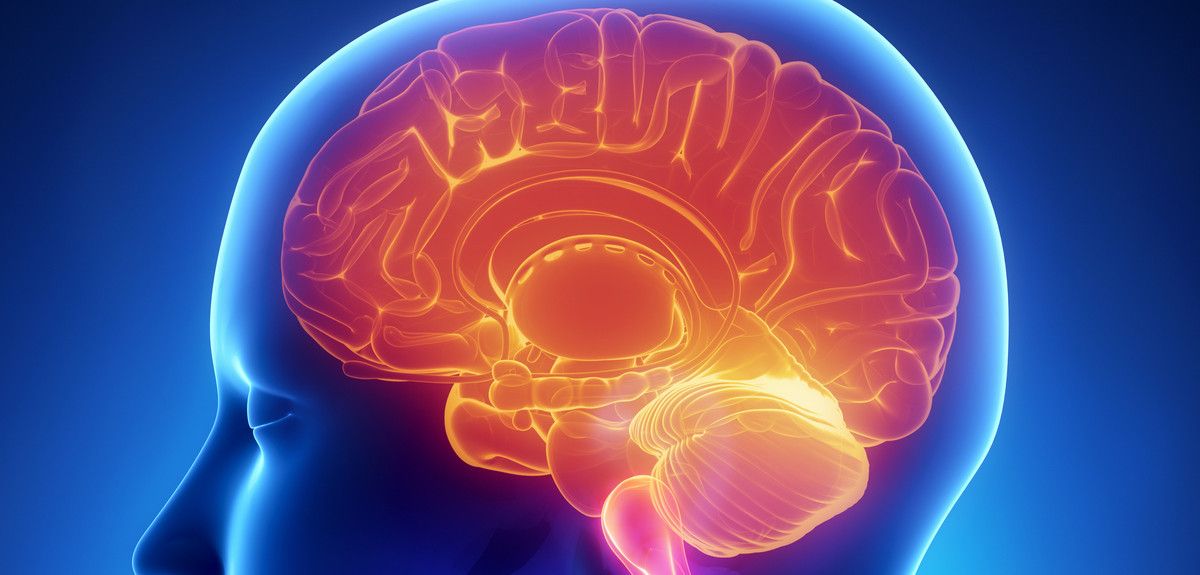
Credit: Shutterstock/CLIPAREA l Custom media. This image comes from Shutterstock
Brain network may be vulnerable to Alzheimer’s and schizophrenia
Oxford University researchers have found a network of brain regions that appears to be more vulnerable to unhealthy ageing – such as Alzheimer's disease – and also seems susceptible to disorders that emerge in young people, such as schizophrenia.
The team showed that, in healthy people, these parts of the brain are the last to develop and the first to show signs of neurodegeneration.
The research, the largest study of its kind, is published in the journal Proceedings of the National Academy of Sciences. It was led by Medical Research Council (MRC)-funded researcher Dr Gwenaëlle Douaud, at Oxford University’s Centre for Functional Magnetic Resonance Imaging of the Brain (FMRIB).
The University of Oxford team used magnetic resonance imaging (MRI) scans to look at changes in the brain structure of 484 healthy people, ranging in age from 8 to 85 years.
These regions seem to be more vulnerable than the rest of the brain to both schizophrenia and Alzheimer's
Dr Gwenaëlle Douaud
The researchers used a 'data-driven' approach to study these age-related changes. This means that, instead of looking for a particular pattern of brain change over the lifespan in a specific location of the brain, they analysed all the imaging data to see what patterns were revealed.
The scientists identified one specific network within the grey matter of the brain which developed later than the rest of the brain, and was the first to degenerate in older age.
Although it has been known for some time that grey matter declines with age, this study reveals one specific network that seems more vulnerable.
This network, consisting of mainly 'higher-order' regions that coordinate information coming from different senses, doesn't develop until late adolescence or early adulthood and is associated with both intellectual ability and long-term memory. These mental abilities become significantly impaired in, respectively, people with schizophrenia or those with Alzheimer's.
The researchers compared the network they had identified from MRI data of healthy subjects' brains, with patterns of grey matter damage observed in brain scans of people with Alzheimer's and people with schizophrenia.
The researchers found striking similarities between the three. They suggest that these areas of the brain may play a role in the emergence of these two very different disorders.
The study was an international collaboration between the University of Oxford neuroscience imaging team, neuroscience researchers from the University of Oslo and research clinicians from the University Hospital Basel, Imperial College London and the University of Oxford's Department of Psychiatry.
Dr Douaud said: 'Our results show that the same specific parts of the brain not only develop more slowly, but also degenerate faster than other parts. These complex regions, which combine information coming from various senses, seem to be more vulnerable than the rest of the brain to both schizophrenia and Alzheimer's, even though these two diseases have different origins and appear at very different, almost opposite, times of life.'
Professor Hugh Perry, chairman of the MRC's Neurosciences and Mental Health Board, which funded the work, said: 'Early doctors called schizophrenia "premature dementia" but until now we had no clear evidence that the same parts of the brain might be associated with two such different diseases. This large-scale and detailed study provides an important, and previously missing, link between development, ageing and disease processes in the brain.
'It raises important issues about possible genetic and environmental factors that may occur in early life and then have lifelong consequences. The more we can find out about these very difficult disorders, the closer we will come to helping sufferers and their families.'
Source: Medical Research Council
 Major new footprint discoveries on Britain’s ‘dinosaur highway’
Major new footprint discoveries on Britain’s ‘dinosaur highway’
 New Year Honours 2025
New Year Honours 2025
 Researchers develop a way to test the ability of red blood cells to deliver oxygen by measuring their shape
Researchers develop a way to test the ability of red blood cells to deliver oxygen by measuring their shape
 New study reveals the COVID-19 pandemic’s impact on other causes of death
New study reveals the COVID-19 pandemic’s impact on other causes of death
 New study calls for radical rethink of mental health support for adolescents
New study calls for radical rethink of mental health support for adolescents
 Significant step towards blood test for Alzheimer's
Significant step towards blood test for Alzheimer's